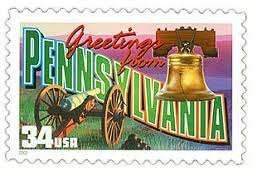CSIG Publishes “Orchestrated” Anti-Online Gambling Survey
Remember billionaire casino owner Sheldon Adelson’s vow to “spend whatever it takes” in his crusade to make online gambling illegal in the United States, and thereby ensure that his major land-based casinos have lessened competition? That spending now includes the publication of a faux research effort in Pennsylvania, one of the US’s battleground states on the topic. The research study’s wild unrealistic findings were quickly denounced as being “orchestrated” by one of the Pennsylvania state legislature’s primary sponsors of responsible, regulatory online-gambling legislation.
In other words, the study is bogus.
 The villains and liars in the story remain the same, beginning with the radical anti-online gambling Coalition to Stop Internet Gambling (CSIG). CSIG, funded by Las Vegas Sands Corporation and beholden to the whims of LV Sands CEO and primary owner Adelson, has for the past couple of years pumped out a steady stream of false and misleading propaganda.
The villains and liars in the story remain the same, beginning with the radical anti-online gambling Coalition to Stop Internet Gambling (CSIG). CSIG, funded by Las Vegas Sands Corporation and beholden to the whims of LV Sands CEO and primary owner Adelson, has for the past couple of years pumped out a steady stream of false and misleading propaganda.
Photos of kiddies supposedly gambling online, with swiped credit cards from parents, and using a simple smartphone app to access online gambling sites? Check, despite the fact that all regulated US sites and all major international operators have strict ID-verification processes in place to make sure such scenarios don’t occur.
Creating a false research study with preposterous results, while failing to provide the methodology for the study? Yep, that’s a page from the CSIG playbook, too.
On display in recent days are the results of a telephone poll funded by Adelson and LV Sands and conducted by Harper Polling, a GOP-themed research house that specializes in providing tailor-made results supporting specific social topics, generally supporting conservative causes and the wishes of the people funding the studies.
Immediately following last month’s Pennsylvania State Assembly hearing regarding the possible regulation of online gambling in Pennsylvania, Adelson and CSIG commissioned a phone survey designed to claim that public opinion in the state is against such legislation.
The survey claims to have included results from 513 registered voters in Pennsylvania, contacted via phone between April 22nd and April 27th, and summarizes with the amazing, unbelievable statement that in regards to the current legislation being considered in the state:
“… a resounding 73% of voters in Pennsylvania oppose legalizing online gambling. Opposition increases to 75% among Republicans, 78% among women and self-identified Conservatives, and 81% among Independents.”
It’s all bollocks. What the survey really shows is how highly skewed a public-opinion poll can be made to appear when respondents are led by the nose to provide certain answers.
And that’s why PA State Rep. John Payne, whose AB 649 bill was at the center of last month’s debate, quickly dismissed the CSIG-directed study as propaganda. When contacted by the Allentown Morning Call about the study, Payne replied, “I don’t hold much credibility to the survey because of the way it was done. [] The entire poll is designed and orchestrated to give the answers they want.”
Indeed. Not only does the poll appear to incorporate a disproportionate percentage of conservative voters likely to provide the desired responses, it’s clear that respondents were subjected to a lengthy series of leading statements designed to steer them toward agreeing that online gambling is one of the Four Horsemen of the Apocalypse.
It’s extremely telling that Harper Polling and CSIG have not provided, for publication, the script used in conducting the actual survey. The same goes for the response flowchart that likely would have been used.
Instead, such blanket findings as the massive “anti” numbers cited above turn out to have been the result of a series of misleading and demonizing statements designed to color respondents’ perceptions of online gambling. It turns out that the study was also a means of testing the effectiveness of several different “bullet point” statements for their future use in policy debates.
As the Harper Polling summary to CSIG stated (and which CSIG haughtily published):
Arguments For & Against
See Table 1 for a breakdown of the message tests against online gambling ranked by effectiveness. All of the messages were highly effective, making at least 74% of those surveyed less likely to favor legalizing online gambling. The most effective argument was about the potential for children to be exposed, which appeals to a wide range of demographic groups. Even the two messages provided as “pro-online gambling” arguments earn high ‘less likely’ numbers, reflecting the fact that voters are so strongly predisposed to disliking online gambling regardless of what arguments they hear in support of it.
That the study can make these statements about its intent — making “effective” statements against online gambling — and still present itself as legitimate research is nothing short of preposterous. [And the two pro-online gambling statements were asked after all the anti-statements (examples below), making them effectively predisposed.]
Statements such as these were read to respondents to judge their effectiveness, long before the respondents were asked about their own feelings regarding online-gambling legislation or legalization:
- Legalizing online gambling in Pennsylvania will make it easy for children to be exposed to and participate in gambling, since it is nearly impossible to prevent minors from gambling online.
- As the FBI told Congress last year, “online casinos are vulnerable to a wide array of criminal schemes,” and “may provide more opportunities for criminals to launder illicit proceeds with increased anonymity.”
Mind that these and other blatant lies were presented to the survey’s respondents as proven facts about the regulated online gambling industry. Amazing stuff.
As one can see, CSIG and Sheldon Adelson know no shame in their efforts to con unsuspecting third parties into following their beliefs. It’s not wrong to have those beliefs, of course, but it is very wrong to lie and misrepresent the basis of those beliefs to others. This fake Pennsylvania online-gambling survey is just about as crass as it gets, but that’s what the public has been subjected to from CSIG and the deep-pocketed Adelson all along.


















COMMENTS